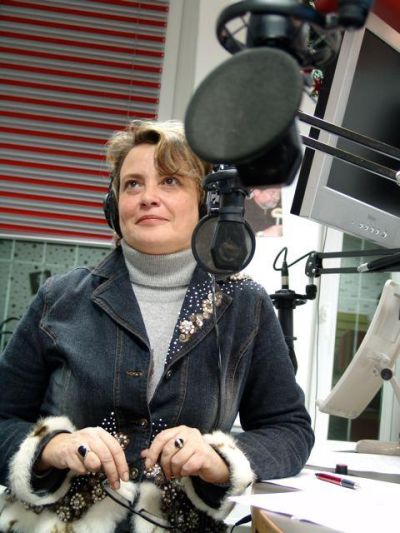Homeless Poles in Germany. Stories that need to be heard!

3. Help that saves lives
The last episode is dedicated to the people who are there every day for those in need: the street workers, doctors and social workers. It becomes clear that their work can change the lives of the homeless people, even if it’s just for a moment.
“Our patients have nothing when they come to us. No documents, no friends, no insurance,” explains Barbara Paśnicki, head of the “Krankenwohnung” (“patients’ flat”) project in Berlin. Here, in this special place, homeless people, including those from Poland, are given medical assistance and an opportunity to live in decent conditions, at least for a short period of time. However, there are only 20 spaces like this one in the whole of Berlin, while the number of people who need them runs to the thousands.
The German aid network for homeless people is very highly developed. The system offers support at many different levels, from street workers to social workers and specialist facilities such as the “Krankenwohnung”. However, the extent of the problem dwarfs the level of support on offer. “Every day, we receive up to ten applications for a space in our flat, but we have just 20 spaces to offer,” Paśnicki explains. “It’s particularly hard in the winter, since we get a lot of amputees or people suffering from frostbite. We can’t simply send them back out onto the street.” The “Krankenwohnung” is also a place where those in need of palliative care can spend their final days in dignity. “We simply can’t allow people to die out there on the street,” Paśnicki says.
The role of the street workers is to make “home visits” to the homeless people every day, under bridges, at train stations and in parks. Zuza Mączyńska from the Berlin-based organisation “Gangway” has been doing the rounds in these places for eight years, offering people help and support. “Sometimes, they just want to talk. Sometimes we help them obtain documents, or accompany them to hospital or to the embassy,” she explains. But not everyone feels like talking. “Our job is to treat people with respect and not to force them into doing anything. We visit them at home, even when that home is the street,” Mączyńska says.
In the Caritas walk-in clinic in Berlin, Dr Inka Wisławska has been a volunteer doctor offering treatment to homeless patients for years. “The people come to us with injuries, infections and illnesses that are a direct result of living on the street. We treat and stitch their wounds and give them advice about general medical issues such as diabetes and high blood pressure,” Wisławska explains. Around 40 % of her patients come from Poland. “Most of them are men who have already been completely worn down by life on the streets of Berlin,” she adds.
Sylwia Jasion from Hanover has been supporting homeless people for years. She organises Christmas gifts, coordinates donation campaigns and helps the homeless obtain documents. “If the German Polonia hadn’t been so committed to helping, we wouldn’t have managed to achieve all this. Together, we can really get a lot done,” she says.
Pastor Janusz Kuskowski, a Salesian in Berlin, is a regular guest at Ostbahnhof railway station. “For the homeless people, it’s often a shock when a pastor brings them coffee or a sandwich. But it’s precisely this that creates the sense of trust that they so urgently need,” he says.
Despite all the efforts being made, however, success stories are few and far between. As Dr Wisławska admits: “In the eight years that I’ve been doing this work, I’ve had maybe five patients who have managed to get away from life on the street.” And yet: each one of these stories is living proof that it is possible.
Dr Tomasz Skajster, a neurosurgeon living in Berlin, points to one aspect of the problem that is all too often overlooked: mental illness. “Homelessness is a symptom of untreated personality disorders, which are frequently hidden beneath alcohol abuse and other addictions,” he explains. He also stresses that those affected are often not capable of functioning in a social, family or professional environment. In Germany, these people are eligible for medical care and support, but the system is not perfect. Dr Skajster’s comments shed a new light on the problem of homelessness and point to the need for specialist psychological and psychiatric care for homeless people. Dr. Skajster stresses that systemic solutions are needed here. “I gave a presentation about the needs of Polish homeless people to the Polish expert committee for the prevention of homelessness. Changes at constitutional level are urgently needed in order to be able to help these people effectively,” he says.
Homelessness is a problem that needs to be addressed not only through individual interventions, but through systemic support. The podcast “Homeless Poles in Germany” proves that it is possible to help those in need. But the road back, away from the street, is often long and laborious.
Monika Sędzierska, February 2025
The podcast is produced by Monika Sędzierska and Adam Gusowski, journalists at the RBB/WDR COSMO public radio station.
All podcasts in the series “COSMO po polsku” are available at COSMOPOPOLSKU.DE and via streaming services such as Spotify (1 / 2 / 3), ARD Audiothek (1 / 2 / 3) and Apple Podcasts (1 / 2 / 3).
“COSMO po polsku” is on air from Monday to Friday from 10pm on Radio COSMO (WDR, RBB, Radio Bremen).
Contact: cosmopopolsku@rbb-online.de








![Redakteur:innen von „COSMO [Radio] po polsku“. Von links: Tomasz Kycia, Adam Gusowski, Maciej Wiśniewski, Monika Sędzierska Redakteur:innen von „COSMO [Radio] po polsku“. Von links: Tomasz Kycia, Adam Gusowski, Maciej Wiśniewski, Monika Sędzierska](/sites/default/files/styles/width_100_tiles/public/00%20Redaktorzy%20prowadza%CC%A8cy%20audycje%20COSMO%20Radio%20po%20polsku.%20Od%20lewej%20Tomasz%20Kycia%2C%20Adam%20Gusowski%2C%20Maciej%20Wis%CC%81niewski%2C%20Monika%20Se%CC%A8dzierska.%20RBB%20Berlin%2C%202019.%20Copyright%20RBB.jpeg?itok=luTJDjgi)